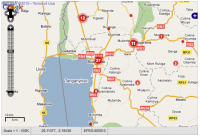
Amatora mu Mahoro (“Peaceful Elections”) is an Ushahidi-based project created to monitor Burundi’s 2010 elections.
Posted by Lova Rakotomalala on Nov 11, 2010

Amatora mu Mahoro (“Peaceful Elections”) is an Ushahidi-based project created to monitor Burundi’s 2010 elections.
Amatora mu Mahoro (“Peaceful Elections”) is an Ushahidi-based project created to monitor Burundi’s 2010 elections (between May and September 2010), with the aim of promoting a peaceful election process and supporting appropriate responses to problems.
Instead of opening the platform to the public, as has been the case with well-known instances of Ushahidi in Kenya, Amatora mu Mahoro limited participation to a smaller group of 430 trained election monitors stationed throughout the country. Rather than publishing unverified monitors’ reports immediately, the project’s staff called the monitors to ask for more information about each report before posting it to the website.
At the time of writing this summary, 1,500 reports had been submitted and the project published daily reports and official statements targeted towards the press and political leaders. They also had press meetings and claim that the data they collect is used by the police to take measures against violent acts.
This information was particularly valuable considering that, even tough these were the first elections since all rebel movements laid down arms and officially ended Burundi’s long civil war, ethnic tensions were still present and some opposition candidates withdrew from the election alleging that the government intended to rig it.
I am Jean Bertrand Basuwabo and I am the IT manager of Amatora mu Mahoro, an Ushahidi-based project to map election-related violence during Burundi’s 2010 elections.
We relied on our 430 field reporters all around the country who have been trained in spotting election-related violence. They are the only ones authorized to file reports, which allowed us to be more confident about the type of text messages we received initially.
The field reporters have been trained extensively in election monitoring. They send text messages if they find something suspicious. The data collecting agents who receive the text messages then call back the field reporters to ask for more information about the incident. We then write a full report for the website with the information we gathered at that point. After a week, we request the field reporter who signaled the incident to submit a detailed report of what he saw, by filling out a form with specific information regarding to time, location and type of concerns.
The goal of the project was to map electoral violence using Ushahidi, to provide support for the NGOs involved in the country, and to provide a clear picture of the initiatives that were taken to prevent electoral violence.
To help spread the word, after each voting day, we would publish reports and official statements targeted towards the press and political leaders. We also had press meetings, where media were present. Recently, we had a presentation on monitoring whether democratic principles were respected during the elections. PACAM (Plan Commun d’Appui aux Médias/Common Plan for Media Support) made a thorough report on our project. They also invited representatives of civil society, the governing party and other public figures to weigh in and debate the reports we published.
The main issue was a lack of commitment from many of the local organizations.
Some field reporters did not understand fully what their tasks entailed.
In this country, only a limited group of people have access to the Internet and they are still not very savvy in terms of new media. This was a problem when we wanted to share the information with the larger population.
As the IT manager, I encountered a few other issues. We had basic Internet connection problems, low speed but also power outages. All this posed a problem when I needed to synchronize the SMS messages that were coming in during any kind of shortages. We wrote a script to address this issue of synchronizing during the outages, but it worked only for UNIX and our system was mostly running on Windows.
I did not have full access to the core system when we encountered problems (the server also was run from Kenya). Sometimes we had to contact the staff in Kenya to solve a few core issues and they are also busy on other projects, so availability was sometimes a challenge.
Finally, there were a few bugs in some of the functions of the platform that we need to correct in the near future. For instance, the “get alerts” function was not always responding.
Some strings were still in English, which is a problem for a francophone country. Another issue we often encountered was that the online map would not display some of the dots marking locations where reports were made if one used Explorer instead of Firefox or Chrome.
The government is quite neutral about the project because it gives them an idea of what is going on in the country. The data we collect are also used by the police to take preventive measures against violent acts.
The idea originated in Kenya, but we are the first in Burundi. We are trying to assess whether we can expand this project after the elections into the field of governance or human rights.
The project was established as a joint partnership between international and national organizations, among them the International Foundation for Electoral Systems (IFES), the Civil Society Coalition for Election Monitoring (Coalition de la Société Civile pour le Monitoring Electorale, COSOME), the Quaker Peace Network–Burundi (QPN), the Episcopal Commission for Justice and Peace (Commission Episcopale Justice et Paix, CEJP) and Oxfam Novib, with the support of USAID. We also collaborate with Accord, the American Friends Service Committee, La Benevolencija, Human Rights Watch, International Alert and Search for Common Ground.
Comments
Post new comment